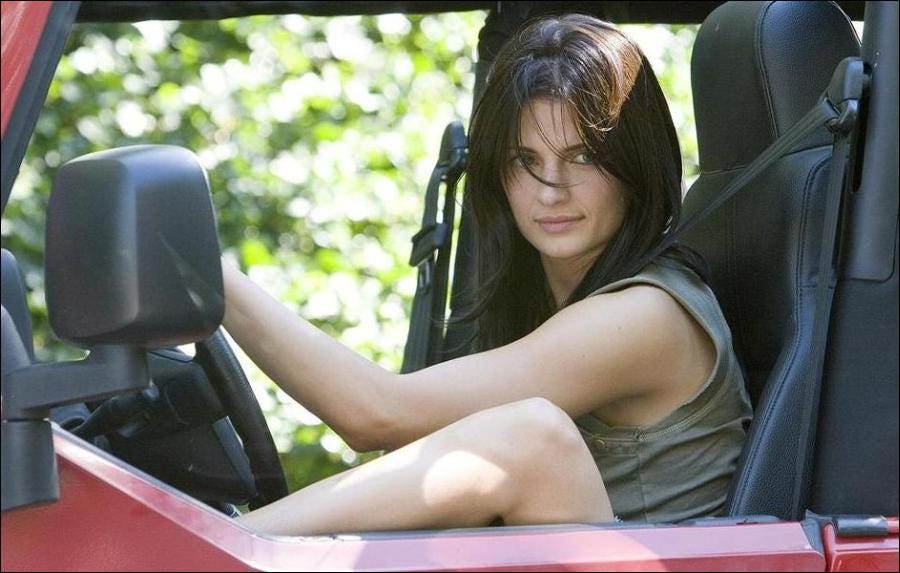feast of love
FIlm, 2007, 3 stars
Directed: Robert Benton
Written: Allison Burnett
Before watching Feast of Love I actually had no idea that there was any queer content in the film. However, the first thing they showed was a group of women playing a softball game, so I knew the lesbians couldn't be far behind.
To be fair, the novel actually starts out this way, but such iconography is typical of the way Hollywood foreshadowed queer content in the 2000’s. If it had been gay men they would have set the scene at night in a disco, or played "We Are Family" in the soundtrack as some men sashayed down a busy shopping mall. My point is, these things we laughed at in queer films as cliché were the common tools of the trade in straight film. It was a pleasant surprise that this mainstream treatise on the many diverse quirks and heartbreaks of love even contained lesbians at all, if only for the first fifteen minutes.
Director Robert Benton has a long history of writing and/or directing films that explore the complex nature of human relationships, usually in a slow, methodical way that rewards patient viewing. Feast of Love is no exception, but it is not as well executed as his previous classic films such as Places in the Heart and Kramer vs Kramer. The overly sentimental script is almost - but not quite - rescued by the deft touch of the talented, name-heavy cast.
The film follows a group of men and women, an older couple who have experienced personal tragedy and are learning to be intimate again, a middle-aged man finding that his tendency to blindly follow his heart means he never really sees the women he falls in love with, and a young couple who, despite what they have already survived, are about to face tragedy on a scale that is inconceivable to them. The idea is that love is tragic, powerful and sometimes duplicitous. It can't be trusted, and yet somehow must be trusted in order for us to survive in the world.
Despite a tendency to wallow in it's own misery a little, and relying on some of the most overused language in the history of romantic films, Feast of Love gives us many scenes that I found touching. Unfortunately, a film needs to be a whole entity rather just a collection of scenes, and in trying to mash so many love stories into one this film it overloads us with its rather saccharine approach to life.
Selma Blair puts in what I have to say would be the most restrained performance of her career as Kathryn, a woman who after six years of marriage falls for another woman. Her husband Bradley (Greg Kinnear), too-quickly rebounds onto Diana (Radha Mitchell) a real-estate agent who tries to convince herself she is in love with Bradley while carrying on a hopeless affair with a married man.
Morgan Freeman once again plays "the voice of God". It started with The Shawshank Redemption. Then he actually played God in Bruce Almighty. We've all seen one of those movies. It's time to stop and let somebody else be the all-knowing voice of wisdom, just like it was time for Kevin Costner to let somebody else make a film about baseball.
Freeman plays Harry, an old Professor who has a fascinating and beautiful wife he loves but never touches. He spends his time observing and advising the younger characters in an attempt not to face his own crisis of the heart. His act of witnessing the stories around him is their glue. Your ability to enjoy the film depends upon your willingness to immerse in his emotional world and not be turned off by the film's shameless attempts to manipulate your emotions.
But Feast of Love has a pall that hangs over it from the beginning, this unshakeable feeling that somebody has to die before the story can resolve itself. About halfway through you realise who that person will be, but that doesn't ease the tension at all. Only when the tragedy actually happens is there some kind of flood of relief, like the sun finally shining after weeks of rain.
Through these melodramatic moments are confronting scenes of sex and anger and cruelty that jar with the film's sedate pace and gorgeous Portland woodland setting. Feast of Love does not hold back on the subject of sex, treating it as yet another aspect of love that must be wrestled with and confronted. Arguments happen with full-frontal nudity (obviously female and not male, the film isn't that brave), and sex scenes happen with the blankets thrown off with lust and abandon.
In this way alone the film feels more European than American, and a touch more interesting than your average Hollywood fare. Radha Mitchell bears the brunt of this burden and sometimes even with just her naked body as a tool manages to play the vulnerable and the conniving parts of her character beautifully off against each other.
Mitchell's performance is by far the best thing about this movie. It is both real and shocking in its callousness and rivals her work in films such as High Art and Melinda & Melinda. I can't help thinking that in a better-written film this performance might have catapulted her into a whole new stage of her career. As it is, this classifies as a film to catch on DVD if you are a sappy romantic at heart who isn't afraid of a good weep.



